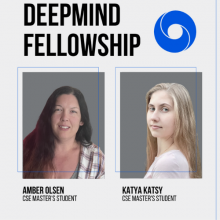
Mar 10, 2023
UC San Diego “Fallen Star” Team Rises to the Top in ICPC Regional Contest
By Kimberley Clementi A team of UC San Diego computer science and math students ranked first place in the Southern California Regional round of the International Collegiate Programming Contest (ICPC), the world’s largest and most prestigious programming competition. The team outperformed peers...Read More

Mar 2, 2023
Meet the Inaugural Cohort of ServiceNow Scholars
By Katherine Connor Nine undergraduate computer science and engineering students at the Jacobs School of Engineering at UC San Diego have been selected as inaugural recipients of the ServiceNow scholarship. ServiceNow Scholars are computer science students with outstanding academic merit,...Read More

Feb 24, 2023
CNS’s Network Grows Stronger
By Kimberley Clementi UC San Diego’s Center for Networked Systems (CNS) is adding four additional faculty members to its growing ranks. Department of Computer Science and Engineering (CSE) assistant professors Earlence Fernandes, Imani Munyaka and Amy Ousterhout will be supporting CNS research...Read More

Feb 13, 2023
Two New Deep Minds Join CSE's DeepMind Fellows
By Kimberley Clementi UC San Diego’s Computer Science and Engineering Department (CSE) is proud to announce two additional DeepMind Fellows, adding to the growing class of exceptional machine learning master’s students to benefit from the program since it began in 2020. Katya Katsy and Amber Olsen...Read More

Feb 9, 2023
Cybersecurity Expert Stefan Savage Elected to the National Academy of Engineering
By Ioana Patringenaru UC San Diego cybersecurity expert Stefan Savage, whose work examines a wide range of technologies, from cars, to spam emails to cryptocurrencies, was elected to the National Academy of Engineering. It’s the latest in a long series of accolades for Savage, who has also...Read More

Feb 1, 2023
CSE Researchers and Intel Join DARPA Program to Prevent Exploitation of Computing Systems
Credit: Intel What’s New: Intel and the UC San Diego announced they have been selected to join the Hardening Development Toolchains Against Emergent Execution Engines (HARDEN) program team for the Defense Advanced Research Projects Agency (DARPA). Adversaries have crafted increasingly complex...Read More

Jan 25, 2023
New CSE Faculty Member Amy Ousterhout Races Ahead
By Kimberley Clementi It’s been said that slow and steady wins the race. But high performers like Amy Ousterhout, a new assistant professor in UC San Diego’s Department of Computer Science and Engineering, set a pace few can match – whether she’s navigating the fast-track in academia or a high-...Read More

Jan 5, 2023
UC San Diego Leads $50.5M Center for Computing
By Ioana Patringenaru and Katie E. Ismael Researchers led by Tajana Simunic-Rosing, a computer science professor at the University of California San Diego, received a $35 million contract from the Semiconductor Research Corporation to make computing orders of magnitude faster and more efficient....Read More

Dec 22, 2022
Security Sleuths: Computer Scientists’ Solutions to Security Issues Withstand the Test
By Tiffany Fox and Katie E. Ismael Twenty, 15, even 10 years ago, computer scientists were just beginning to discover the power of big data, building better user interfaces for the Internet of Things … and quickly realizing encryption and security would play a big role in all of it. Now in 2022,...Read More

Dec 22, 2022
Vice President Kamala Harris Honors CSE Student Naba Rizvi (PhD ’25)
By Kimberley Clementi I send my warmest congratulations on your selection as a Computer Science Hero. Vice President Kamala Harris sent a personal note of congratulations to Naba Rizvi, a PhD student in UC San Diego’s Computer Science and Engineering (CSE) department, for her recent recognition...Read More

